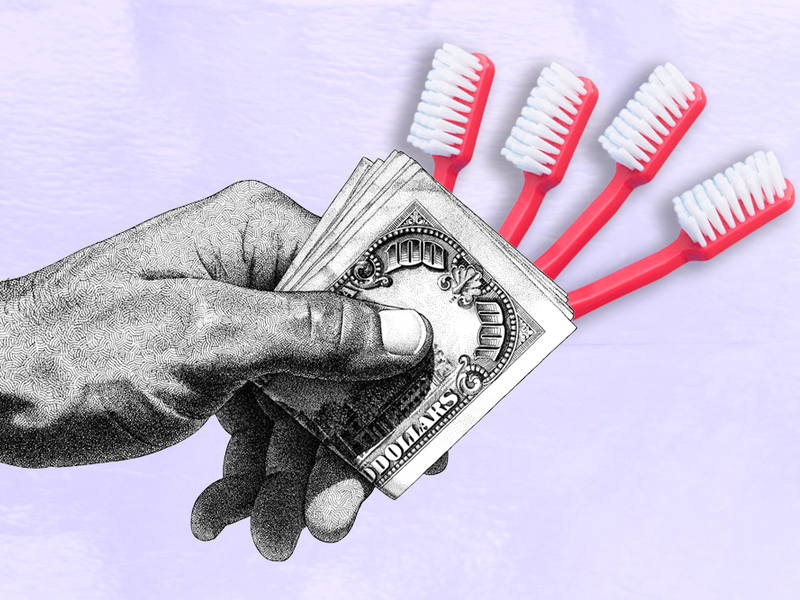
Private equity investments in healthcare aren’t limited to physician groups, nursing homes or urgent care clinics. A new report highlights the firms’ increasing role in the highly fragmented dental industry.
The Private Equity Stakeholder Project, a not-for-profit group that researches the effects of private equity investments in various industries, issued a report Thursday warning about the potential harms of such outlay in the dental industry. The report says private equity investors demand returns that incentivize profit-driven practices like unnecessary services, misleading advertising and Medicaid fraud.
Since most states require dentists to own their practices, private equity groups affiliate with them by buying what’s known as dental service organizations (DSOs). DSOs provide non-clinical practice management and business services like human resources, accounting, marketing and procurement. While DSOs currently comprise a small portion of the overall dental market, the report says that share is growing rapidly.
The American Dental Association says 10.4% of dentists were affiliated with DSOs in 2019, up from 7.4% in 2015. The trade association said it expects consolidation and DSO affiliation to continue to increase in the future. DSO-affiliated dentists skew younger and are most likely to specialize in orthodontics and pediatric dentistry, according to the ADA, which declined to comment on PESP’s report.
DSOs are also overwhelmingly owned by private equity groups. Across the top 30 DSOs, for example, 27 are private equity owned, the report found. The largest is KKR-owned Heartland Dental, which has 1,142 clinics, according to the report. Aspen Dental Management, Inc., the country’s second largest DSO, has roughly 1,000 locations in 46 states. Aspen is 80% owned by private equity firms Leonard Green & Partners and Areas Management and 20% owned by PE firm American Securities plus its management and dentists.
“The most surprising thing was just the extent to which private equity has made inroads,” said Eileen O’Grady, PESP’s research coordinator and the report’s author.
The problem with that, O’Grady said, is the industry is largely unregulated. Private equity groups don’t have to report their investments in DSOs to state or federal regulators. More importantly, she noted there are no rules limiting the financial incentives DSOs can use to make dentists churn through more patients and perform more procedures.
Dentists affiliated with DSOs are legally responsible for clinical decisions, but in practice the delineation of responsibilities gets murky, O’Grady said. There’s no standard payment arrangement structure between dentists and DSOs. In some cases, the DSOs pay dentists based on a percentage of payments received for dental services. DSOs may also offer productivity or profitability bonuses.
The report highlighted a 150-clinic DSO called Benevis, formerly known as Kool Smiles, as a case study. The company—which has gone through several private equity owners—paid almost $24 million in 2018 to settle Department of Justice allegations that it submitted false claims for medically unnecessary dental services performed on children insured under Medicaid. The claims included medically unnecessary root canals on babies, tooth extractions and stainless steel crowns.
The government says Benevis pressured dentists to deliver more services using cash bonuses and disciplining those that underperformed. Benevis, which went through a bankruptcy and restructuring last year, did not return a request for comment.
Aspen Dental has been the subject of substantial regulatory scrutiny over the past decade, and has paid at least $1.7 million in that time to settle with state attorneys general in Pennsylvania, Massachusetts, New York and Indiana, the report noted. New York’s Attorney General in 2015, for example, found the company incentivized staff to increase sales of dental services, pushing revenue-oriented scheduling and oversight of clinical staff. That same year, Indiana’s Attorney General found Aspen used deceptive advertising, especially to seniors, that misrepresented the true cost of services and placed unanticipated financial strain on them.
Aspen did not return a request for comment. The Association of Dental Support Organizations, a DSO trade group, also did not return a request for comment. PESP’s report noted the ADSO is run almost entirely by private equity-affiliated DSOs.
The report likens private equity investments in DSOs to investments in physician practices. Both industries appear to have been created largely by private equity firms to avoid regulation that prohibits investor ownership of clinical practices, the report said.
Ultimately, O’Grady said she thinks there needs to be a lot more oversight into private equity’s dental investments.
“When you have private equity firms with sometimes 20% to 25% return expectations over relatively short time periods, you have to ask, ‘What is going to be the impact on patient care?'”
Source link : https://www.modernhealthcare.com/finance/report-private-equity-dental-care-raises-risk-overtreatment











